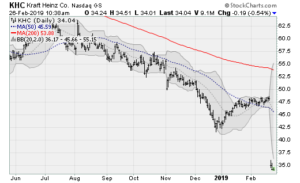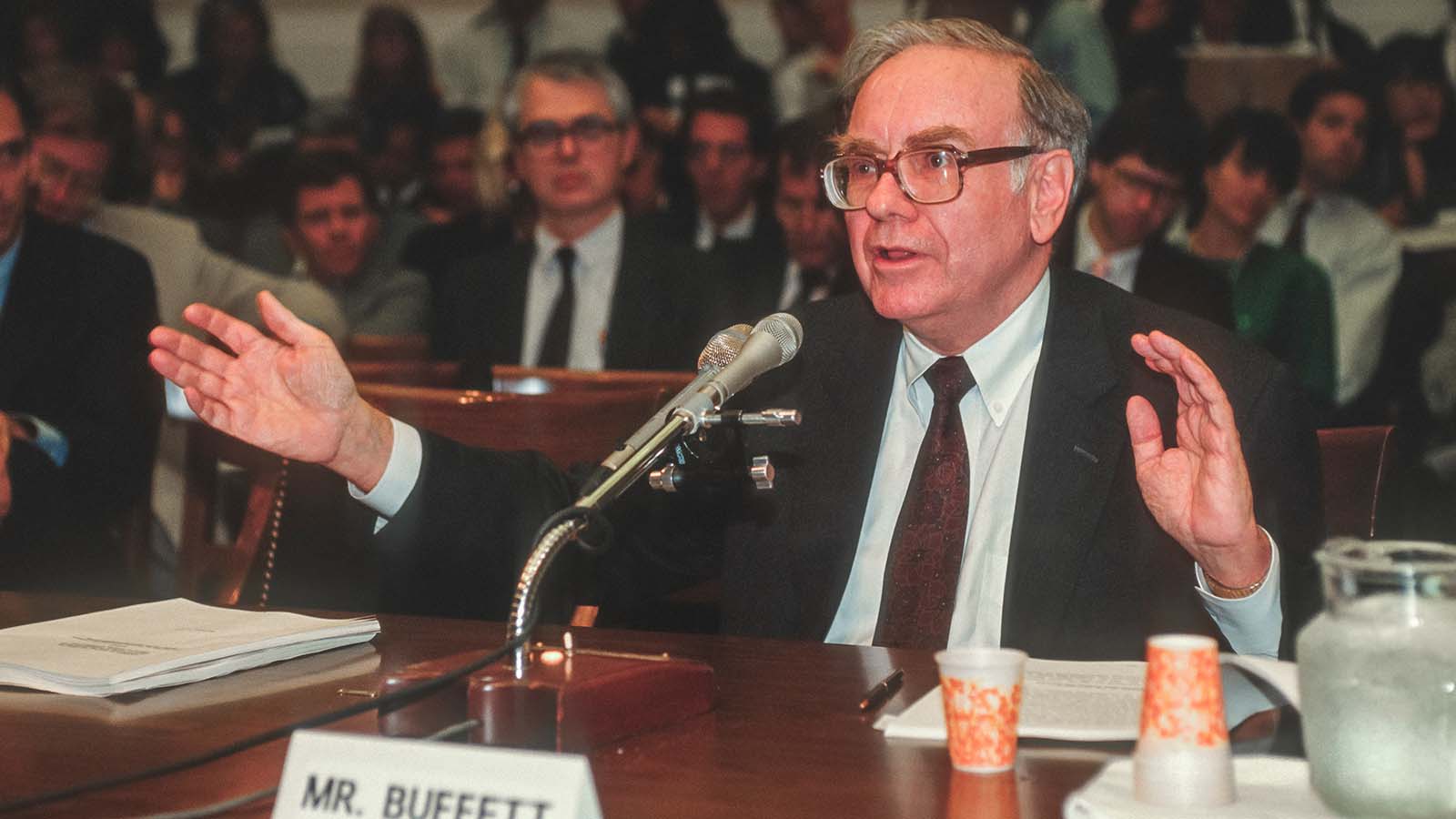
Since taking over the reins of Berkshire Hathaway (NYSE:BRK-A, NYSE:BRK-B) as CEO in 1965, Warren Buffett has overseen compounded gains of 20% a year. That’s more than double the returns of the S&P 500.
Not every year was a winner. At numerous points over the past 58 years, Buffett lost to the popular benchmark index. Sometimes by a wide margin. But Buffett’s strategy of buying excellent companies at fair prices and then holding them long-term continues to pay off.
We’re talking about an aggregate gain of 3.7 million percent! For comparison, the S&P 500 delivered 24,708%, including dividends. Warren Buffett’s biggest stock bets in Berkshire Hathaway today are worth noting.
The following seven companies hold the largest percentage in his portfolio.
Apple (AAPL)
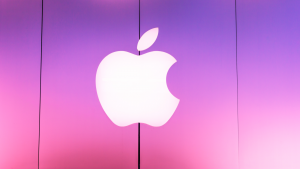
It’s been well documented that Apple (Nasdaq: AAPL) is the Oracle of Omaha’s favorite stock. He owns over 915 million shares of Apple stock worth $161.5 billion. It makes up nearly half of Berkshire Hathaway’s total value (46.3%). It’s also five times greater than his second-biggest bet.
Buffett began buying Apple stock in 2016 and regularly adds to it. It was arguably more notable that he didn’t buy any shares in the second quarter after adding over 20 million shares in the first.
The reason Buffett loves Apple is because it meets his investment criteria. It has an industry-leading market share, possesses a globally recognized brand, produces strong capital returns, and offers a fair value for its money.
Yet Apple’s future is with its services business. Product sales fell 4.5% last quarter, but services rose 5.6%. The App Store, Apple Music, Apple Pay, and iCloud had $21 billion in sales but margins of 71%. The segment now accounts for 22% of total revenue.
With Apple stock down 11% from its highs, it wouldn’t be surprising to see Buffett buying the stock again.
Bank of America (BAC)
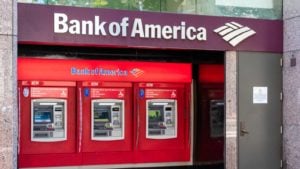
Bank of America (NYSE:BAC) is Buffett’s second biggest holding. It accounts for 8.5% of Berkshire’s total value. His one billion-plus shares are worth $29.5 billion at today’s prices.
Although the Oracle sold off several bank holdings earlier this year, he held onto Bank of America. No doubt because, like Apple, it is one of the largest banks in the country and is financially stable.
The banking crisis earlier this year saw Silicon Valley Bank, Signature Bank, and several others fold. Bank of America’s stock was knocked down due to the crisis of confidence in the system.
Yet many depositors flee their smaller regional and local banks and flock towards their larger brethren. With an unstated government policy that doesn’t allow the biggest to fail, even if Bank of America was in trouble, it most likely wouldn’t be allowed to go under. But it’s not suffering any financial woes, so Buffett held his stake in the bank.
Coca-Cola (KO)

It’s no secret Buffett has a love affair with Coca-Cola (NYSE:KO). Not just the stock, but the soda itself. He says he drank Pepsi for 50 years. Then, in the mid-1980s, a Coke executive sent him a can of Cherry Coke to try, and now he drinks five cans of it a day.
Coca-Cola even splashed his likeness on the can of Cherry Coke when it launched the flavor in China in 2017.
Buffett returned the favor by amassing 400 million shares worth $24 billion. That’s enough for a 6.9% share of Berkshire’s portfolio. There is hardly a brand more recognizable worldwide than Coke. Its why BrandFinance says Coca-Cola is “the world’s most valuable non-alcoholic drink” brand worth $33.5 billion. That’s nearly twice PepsiCo‘s (NASDAQ:PEP) value of $18.3 billion.
American Express (AXP)

Buffett has a long-running love affair with American Express (NYSE:AXP). He acquired his first credit card company shares in 1991 and continued buying more throughout the decade. However, his last purchase was in the late 1990’s.
Despite not buying more, his ownership stake in American Express grew to over 20% because of stock buybacks. Today, it’s valued at $23.9 billion, or 6.9% of Berkshire’s total.
As Warren Buffett told Bloomberg last year, “You can’t create another American Express.” It possesses a status unavailable to any other credit card on the market. The card issuer also targets higher-income individuals who are typically impacted by economic downturns less than others. And though corrections and recessions could hurt AmEx in the short term, such conditions tend not to last very long. Where recessions are measured in months, bull markets are measured in years.
That makes the economics of American Express’ business one of long-term expansion. It also means American Express will likely remain a fixture in Berkshire Hathaway for decades.
Chevron (CVX)
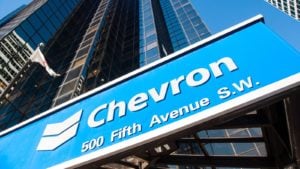
Even though Buffett sold some shares of Chevron (NYSE:CVX) earlier this year, the integrated oil and gas giant remains a prominent fixture in the portfolio. It represents 5.6% of the total, or $19.4 billion.
Warren Buffett took advantage of oil’s low prices in late 2020 to buy this energy giant. Clearly, “peak oil” wasn’t happening, and global demand would perk up again. Oil stocks were among the best-performing stocks in 2021 as demand and prices soared.
Warren Buffett began selling near oil’s peak, and he’s trimmed his holdings in Chevron since. He still owns enough of this behemoth to make it Berkshire Hathaway’s fifth-largest holding. He undoubtedly continues to hold significant sums because he doesn’t see energy prices falling. Instead, the war in Eastern Europe and the destruction of the Nordstream 2 gas pipeline mean the continent faces an extended period of elevated energy costs.
Occidental Petroleum (OXY)
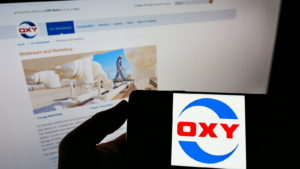
Just as Buffett was selling Chevron, he was buying Occidental Petroleum (NYSE:OXY). After buying almost $8 billion worth of shares last year, he continued purchasing shares almost every quarter thereafter. He now owns 25% of the company and has permission from the Securities & Exchange Commission to buy as much as 50%.
The buying spree means Occidental Petroleum is now worth $13.7 billion. That equates to 3.9% of Berkshire’s total.
Warren Buffett believes the huge U.S. oil-producing Permian Basin region is the real deal for production. He said his acquisition of Occidental stock was “a bet on the fact that the Permian Basin is what it is cracked up to be.”
Yet a constrained global oil supply also provides significant upside potential. Russia’s invasion of Ukraine has created substantial energy shortages. An increase in supply isn’t on the horizon, meaning pricing will remain elevated. That should benefit Occidental Petroleum’s bottom line.
Kraft Heinz (KHC)
Packaged foods leader Kraft Heinz (NASDAQ:KHC) is the seventh biggest holding in Warren Buffett’s Berkshire, accounting for 3.1% of the total value.
The stock represents Buffett’s penchant for buying consumer-facing companies. It’s a theme he returns to again and again when buying businesses. But he hasn’t always loved the business and in the past, he’s called his investment a mistake. “I was wrong in a couple of ways about Kraft Heinz. We overpaid for Kraft,” he told CNBC in 2019.
While he believes the company is “still a wonderful business,” he admits he paid about $100 billion for tangible assets, while it currently uses around $7 billion. The packaged goods company also sits on substantial debt of $19.4 billion. It has less than $1 billion in cash, and the constrained balance sheet limits how much growth Kraft Heinz can manufacture.
But Buffett hangs onto the shares, underscoring his mantra of “the best time to sell is never.” Berkshire Hathaway owns 325 million shares of Kraft Heinz worth $10.9 billion.
On the date of publication, Rich Duprey held a LONG position in CVX stock. The opinions expressed in this article are those of the writer, subject to the InvestorPlace.com Publishing Guidelines.



